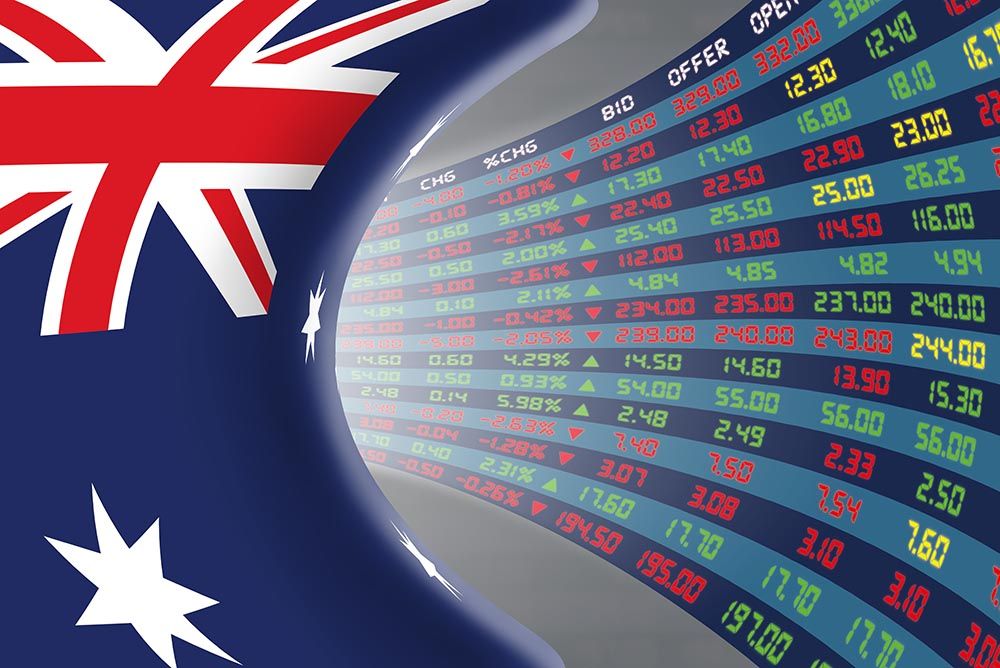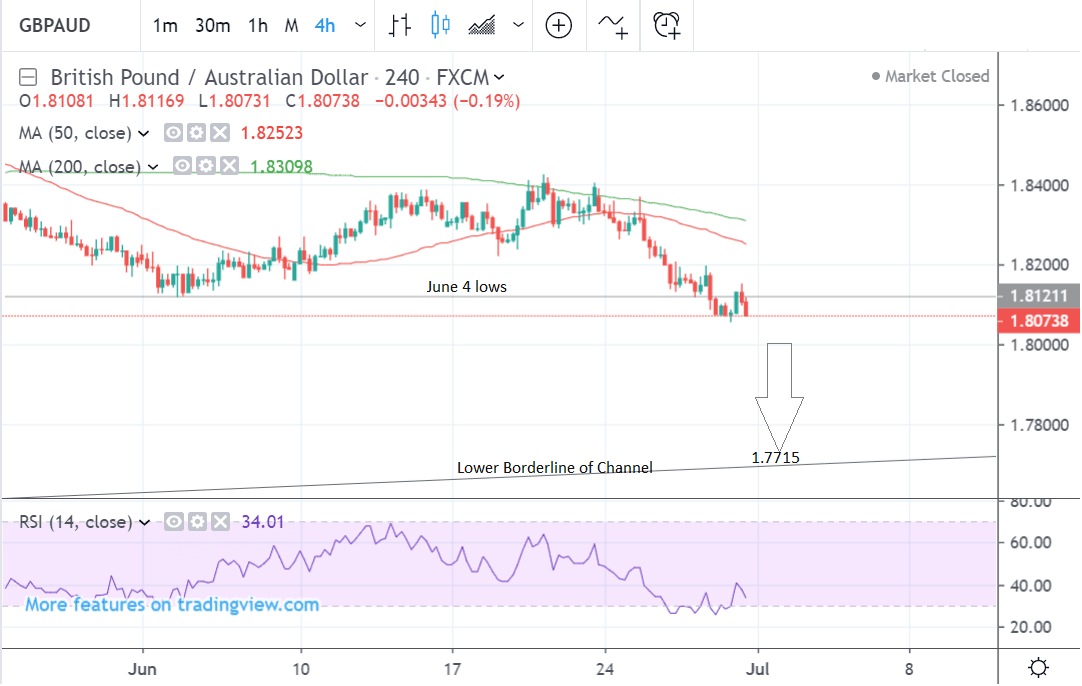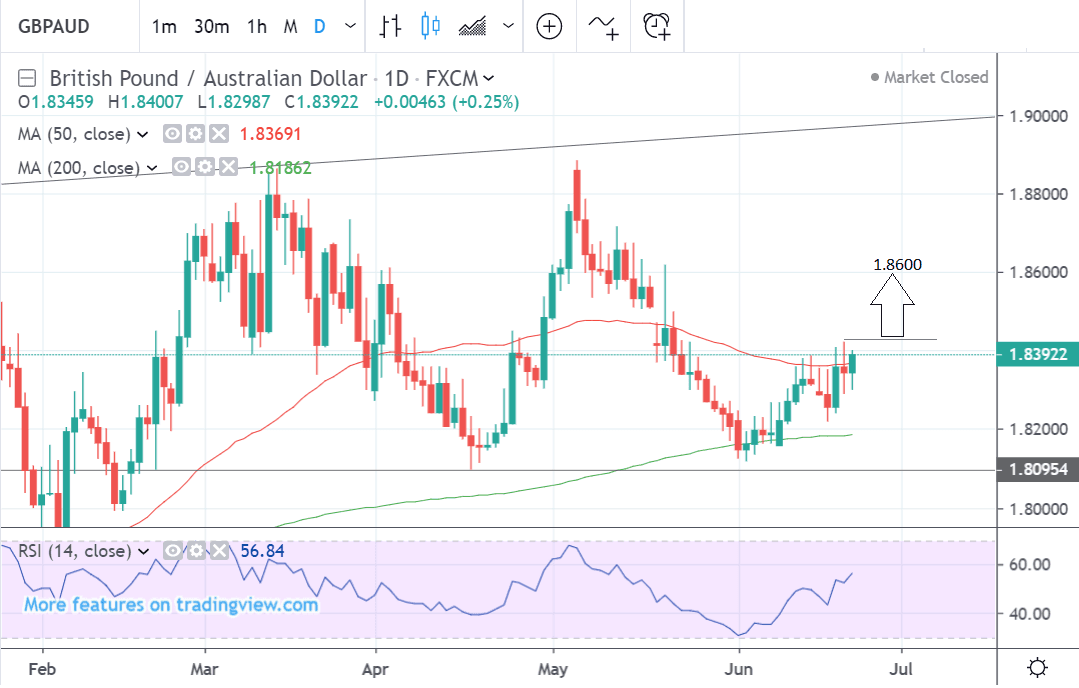Pound-to-Australian Dollar Rate 5-Day Forecast: More Downside Now Expected, RBA in Focus

- GBP/AUD decline forecast to extend
- Short and long-term charts bother looking bearish
- Pound to be driven by PMIs; Aussie by RBA meeting
The GBP/AUD exchange rate is trading at around 1.8073 at the start of the new week, over three cents lower than the previous week. A pair has rolled over and is now in a downtrend which is expected to continue over the next five days.
The 4-hour chart shows how the pair has broken below the June 4 lows - a key level. It has fallen at a steady pace during the last week, and from here we see a strong possibility of an extension at an equally steady pace.
A break below the 1.8000 level could lead to an extension to as far down to a target at 1.7715, at a major trendline and the lower border of the large rising channel.
We use the 4-hour chart to analyse the short-term trend, which means the next 5 days of trading.
The daily chart makes the bearish case clearer. It shows how the exchange rate may be falling in the final C-D wave of an ABCD pattern. Usually, the C-D leg is of a similar length to the A-B level, which would suggest a downside target at about 1.7715 and the lower channel line.
The pair has broken clearly through the 200-day MA on a closing basis and this suggests more downside in the future.
Once it reached the lower the borderline of the rising channel we see a strong possibility of a bounce higher, up to an initial target at 1.8000, as the rising channel continues unfolding higher.
We use the daily chart to analyse the medium-term which is defined as the next week to a month ahead.
The weekly chart shows how the pair has fallen in a long red, down week last week, to the level of the 50 and 200 week MAs clustered around the current lows.
These are likely to provide a hard floor of support below which the exchange rate will probably struggle to fall, however, we do envisage an eventual breakdown to the lower border of the rising channel at 1.7715, as already indicated on the 4hr and daily charts.
After that, the pair could rally back up to 1.8000, go sideways and then rise higher to 1.8500.
Another possible way to interpret the weekly chart is to read the formation of a broadening formation (BF) into it. BF’s are bearish price patterns.
They are normally composed of 5 waves, labeled A-E and the next bearish wave down is likely to be a wave E.
This pattern indicates a potential target at 1.7000, at the bottom of the BF.
We use the weekly chart to give us an idea of the longer-term outlook, which includes the next few months.
Time to move your money? Get 3-5% more currency than your bank would offer by using the services of foreign exchange specialists at RationalFX. A specialist broker can deliver you an exchange rate closer to the real market rate, thereby saving you substantial quantities of currency. Find out more here. * Advertisement
The Australian Dollar: What to Watch this Week
The main fundamental driver of the Australian Dollar is likely to the meeting of the Reserve Bank of Australia (RBA) on Tuesday, July 2, at 05.30 BST.
Despite recent commentary from Philip Lowe - the governor of the RBA - suggesting he thought there were limitations of what rate cutting could achieve, the RBA is expected to cut the base rate by 0.25% at their July meeting, taking the official cash rate (OCR) down from 1.25% to 1.00% - a new record low.
“Markets are currently pricing in 60 bps of policy rate cuts over the next 12 months, with over a 70% chance of an interest rate cut at next week’s meeting. We believe the RBA will cut the cash rate next week, and consensus forecasts share a similar view as well,” says Wells Fargo, the global investment bank, in a note on the meeting.
Should the RBA fail to cut interest rates the Aussie Dollar could rise as.
What will certainly be of interest to currency markets is the guidance the RBA sets with regards to future policy moves: if they display caution, and markets believe further interest rate cuts are coming, the Aussie Dollar could well decline.
However, a more sanguine, even positive, assessment of the outlook could well see the Aussie rise. "A decision to stay on hold would see this week’s AUD gains extended," says John Bromhead, a FX Strategist with ANZ Bank.
ANZ are however expecting a 25 basis point interest rate cut and, "how low the AUD falls will be defined by how aggressively the RBA eases and the success of Chinese stimulus efforts," says Bromhead.
Market sentiment regarding the ongoing trade skirmish between the U.S. and China could well impact on Australian Dollar movements over coming days.
The meeting between Trump and Xi Xinping on Saturday resulted in a small concession from President Trump to allow U.S. companies to sell equipment to Huawei, when previously they had banned from doing so.
Beyond that there was no change to the current arrangements, although the U.S. said it would not increase tariffs on any more Chinese goods as it had previously threatened. Accounts of the meeting suggest U.S. officials confirmed talks are "back on track" and that "we are getting a little bit closer."
"What was billed as an extraordinary meeting reportedly lasted less than 90 minutes, and the results were broadly as expected," says Marc Chandler, Chief Market Strategist with Bannockburn Global Forex.
China will buy U.S. agriculture, and the US will refrain from additional tariffs while the negotiations resume.
"With the US economy slowing as Q2 wound down, and the tariffs on China blamed in some quarters, Trump may not have been in the mood for escalation," says Chandler.
The outcome is ultimately a positive one for global investor sentiment, and therefore for the Australian Dollar we believe.
The Pound: What to Watch this Week
The main releases for the Pound are services, manufacturing and construction PMIs for the month of June. These are surveys of purchasing managers in key sectors and come out at the start of every new month.
They provide a gauge of the level of activity and confidence in the sector. They are seen as a reliable forward indicator of economic growth.
The Manufacturing PMI is forecast to show a rise to 49.5 in June, when it is released on Monday, June 31 at 09.30 BST. This would still continue a worrying contraction in the sector since it would be below the 50 threshold, distinguishing expansion from contraction.
The Services PMI is expected to show no change at 51.0 in June when it is released at 9.30 on Wednesday.
The Construction PMI is forecast to show a rise to 49.4 from 48.6 in June when it is released at 9.30 on Tuesday.
A lower-than-expected reading would probably result in a decline in the Pound and vice versa for a higher-than-expected result.
The Conservative party leadership race is likely to have less of an impact on Sterling in the coming week.
The final vote on who will get the job will not take place until mid-July, with the new leader named on July 23. Apart from that, there is a debate on ITV on July 9.
Boris Johnson is still the bookies favourite with 1/7 (87.7%) odds according to Oddschecker. He is the 'harder' Brexiteer of the two by doggedly adhering to the October 31 deadline ‘come what may’. If his popularity should wane it would boost the Pound, but we doubt Johnson will be threatened by Jeremy Hunt.
Time to move your money? Get 3-5% more currency than your bank would offer by using the services of foreign exchange specialists at RationalFX. A specialist broker can deliver you an exchange rate closer to the real market rate, thereby saving you substantial quantities of currency. Find out more here. * Advertisement


